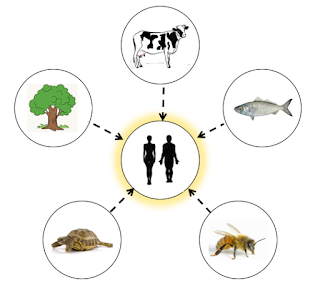Sustainability as pluriversal
By Rodrigo Cáceres
In one of his landmark books, anthropologist Arturo Escobar argues that “sustainability cannot be limited to the sole environmental, economic and cultural dimensions, leaving aside epistemic and ontological aspects” [1]. Indeed, contemporary anthropology is said to be currently going through an ‘ontological turn’, which has meant revealing certain foundational differences between cultures, involving basic-level assumptions about what are the kinds of things that exist in the world. Western capitalist societies are said to be dualistic in the sense that they tend to separate or create radical discontinuities between subject/object, reason/emotion, body/mind, nature/culture, human/non-human, physical/mental, individual/society, and so on. As a manifestation of this ‘ontological turn’, Philippe Descola’s work, for example, reveals how the concept of ‘nature’ is part of the symbolic patrimony of the West, a word that is inexistent in the indigenous cultures he extensively studied [2]. Furthermore, when it comes to this idiosyncratic concept of nature, Marshall Sahlins has uncovered how our political theory is deeply founded on a theory of an ‘avaricious and contentious human nature’ (note how this idea relies on the concept of ‘nature’), an original bellum omnium contra omnes (the war of all against all), that has made way as the basis of modern economic theory as well as the ‘rational choice’ model. [3]
Arguably the best place where we can see what is at stake at this ontological level of differences is in James Cameron’s ‘Avatar’ film, where the conflict between substantialism and relationality is most evident. The movie tells the story of a group of earthlings that arrive at the planet Pandora to colonize and exploit its rich natural resources. The movie’s colonizers are, of course, materialistic, substantialist and profit driven beings, whose modes of thought only allow them to recognize the existence of the rare metal that they hope to exploit for profit and the community of forest dwellers that stand in their way. The local indigenous, on the other hand, are relational-ecological thinkers in that their mode of understanding allows them to recognize the ecological network in which they are embedded as well as the existence of a global being that we could designate as a ‘spirit’, the spirit of Eywa, a being that emerges from the symbiotic relationships of the forest beings. However, the substantialist worldview of the colonizers does not allow them to imagine or realize the existence of Eywa, they cannot see how on the basis of a sylvan network of billions of connections, a global self can emerge at a new ontological level, with its own distinctive character and personhood.
From a more general perspective regarding this failure to ‘see’ Eywa, we must note that, in our planet, western science and logic in practice has systematically preferred analysis over synthesis, de-composition over com-position, the parts over the whole. This is rendered in a beautiful metaphor by philosopher and ethnobotanist Terence Mckenna: “if a person was an alarm clock, the scientific approach goes like this: smash the clock, count the pieces, find the smallest piece, smash it; then count the little pieces, find the smallest ones, smash them; count the pieces, find the smallest one, smash it” and so on and so forth. In practice this has meant “going down” in what we understand as -scopia, in other words, gaining understanding on physiological, biological, molecular, atomic, sub-atomic and quantum levels. If we cannot seem to admit the existence of the spirits of plants or fungi it is because Western logic is inherently analytical and fails to be able to “go up” in these -scopic levels, it cannot take the opposite direction which is accustomed to take, the synthetic, holistic, com-positional or global orientation.
It is important to emphasize here that the recognition of the existence of the spirit world/dimension is very common among indigenous communities, and however it seems something impossible to admit within the scientific materialism in which we Westerners grew up. In this regard, French mesologist Augustin Berque is most concerned with transcending these analytical and reductionist modes of thought which provide us a partial and fragmented understanding of the world. These partial, materialistic, quantitativist and dualistic understandings are the ones that provoke undesirable practices such as ecological destruction and, ultimately, self-destruction.
From my personal understanding of mesology (the study of milieu/mediation), I consider that it is totally compatible with Arturo Escobar’s notion of the pluriverse. The pluriverse is a concept which entails that each living species has its own way of composing or bringing forth her own world, on the basis of our common ground as dwellers of the Earth. In this view, each living species composes its own mode of knowing and perceiving, just as different wind chimes produce a different sound according to their shape and material, ‘interpreting’ the common wind that goes through them in novel and distinctive ways. The same goes for different cultures, since each of them inhabits a particular universe of symbols, words, conventions and techniques. These symbolic universes model and shape different types of humans, who have different modes of knowing and understanding what the world is.
At first sight, it seems like we could only flourish from this diversity of worlds brought forth by different living beings, this pluriverse or world made of many worlds, since each perspective enriches the total knowledge of the world as well as it allows for reflecting upon one’s own perspective situated in a specific world among many worlds. This is rendered in the very profound revindication of the Zapatista movement: “a world where many worlds can fit”. This is indeed a revindication for the pluriverse, a fight for a world where different worlds can coexist, without falling in the gesture of thinking of one’s world as ‘the only world’ and engaging in what Maturana has called a “passion for changing the other”, a desire to convert others into one’s world. This passion for changing others is what is most characteristic about the colonizing/imperial attitude of Western institutions and, for instance, their imposition of the notion of ‘development’ as the only possible horizon for human endeavors.
In fact, one of the lessons that has not been learnt within our Western world is that the main concepts that are the basis of Western discourse, the categories of ‘development’, ‘consumption’, ‘product’, ‘extraction’, ‘natural resource’ and ‘economy’ are all situated within the context of the western symbolic universe and carry with them the dualistic and objectifying features of our destructive relationship to nature. The linguist Arran Stibbe has shown, for example, how even this idea of ‘sustainable development’ is first of all described as a ‘type of development’, since the notion of sustainable only works as an adjective or modifier. But at a deeper level, he reveals how in practice this notion ends up being morphed into ‘sustained development’ which is equivalent to the notion of continued economic growth [5].
I claim that this lesson -the idea of concepts being situated within a specific worldview or cosmology- has not been learnt because supposedly mediating institutions such as the United Nations make these categories their own and put them in a central place in their discourses and policy packages, ending up helping the expansion of western ideology in non-western minds.
We should remember that we are cultural animals to a large extent because of our use of words. Words highlight what is important to us, what is real, what we should aim for, and at the same time, they implicitly define what is unimportant, unworthy of consideration and what does not enter into the fabric of our lives. As one of Jacques Derrida’s central insights goes: “from the moment when there is inscription, there is necessarily selection and, consequently, erasure, censorship and exclusion”.
Why haven’t we had a deeper questioning of the words that our institutions use? It would seem straightforward that if we are going through a civilizational and cultural crisis, a change in our linguistic models would change our priorities and advancing towards bringing forth a truly moral and caring relationship with nature. It would naturally imply IPBES’ (Intergovernmental Platform for Biodiversity and Ecosystem services) central advice of “steering away from the current limited paradigm of economic growth”.
If anything, this ontological level which is the subject of this text concerns our underlying linguistic models of reality, models which shape and give meaning to the practices we do and the way we do them. In other words, they shape us as individuals. A change in our linguistic models of reality is by no means something easy to do, since there are deeply entrenched psychic commitments from old-age institutions as philosophy, science and politics which rely on traditional views and their classical interpretations. However, changing the way we think, speak and act so that ourselves and our institutions can admit the possibility of the pluriverse, seems to be a bright and life-affirming vision worth fighting for.
A final question that arises from this pluriversal understanding concerns the possibility of communicating or mediating with non-human inhabitants of the pluriverse. I consider that this is indeed possible, specifically through the ingestion of psychoactive and psychedelic substances. Archeological evidence reveals how numerous ancient societies from all continents used psychedelic substances for rituals and contact with invisible spirits for purposes like healing, divination, learning, self-knowledge, among others.
Psychedelics have been recently gaining increasing attention from clinicians because of their therapeutic potential. For instance, in a recent study on N,N-dimethyltryptamine use (commonly known as DMT) led by Johns Hopkins’ Center for Psychedelic & Consciousness research, most respondents reported encounters with autonomous beings described as conscious, intelligent, benevolent, and which existed in a different dimension of reality [6]. This is just one example of how the ingestion of certain molecules can transform the body into something like an antenna that can tune into the diverse dimensions of the spiritual world. Its importance is thus twofold: on the one hand it opens up the possibility of learning from other intelligent inhabitants of the pluriverse, which have a different perspective from our own. And on the other hand, it bashes against the dominant ontological model of our culture, one in which it is usually assumed that humans are the only intelligent beings and that the reality in which we are embedded is the only existing one.
In the end, the central issue is changing our way of thinking so that we can give a greater hug to the universe, one that does not deny, dismiss or disdain certain dimensions of it out of prejudice, especially ones arising from partial and dualistic linguistic models that we still carry as a burden.
Notes
[1] Arturo Escobar. (2018). Sentir-penser avec la terre. Le Seuil.
[2] Philippe Descola. (2005). Par-delà nature et culture (Vol. 1). Paris: Gallimard.
[3] Marshall Sahlins. (2008). The Western illusion of human nature: with reflections on the long history of hierarchy, equality and the sublimation of anarchy in the West, and comparative notes on other conceptions of the human condition (Vol. 32). Prickly Paradigm.
[4] Eduardo Kohn. (2013). How forests think: Toward an anthropology beyond the human. Univ of California Press. p. 57.
[5] Arran Stibbe. (2015). Ecolinguistics: Language, ecology and the stories we live by. Routledge.
[6] Davis, A. K., Clifton, J. M., Weaver, E. G., Hurwitz, E. S., Johnson, M. W., & Griffiths, R. R. (2020). Survey of entity encounter experiences occasioned by inhaled N, N-dimethyltryptamine: Phenomenology, interpretation, and enduring effects. Journal of Psychopharmacology.





Comments
Post a Comment